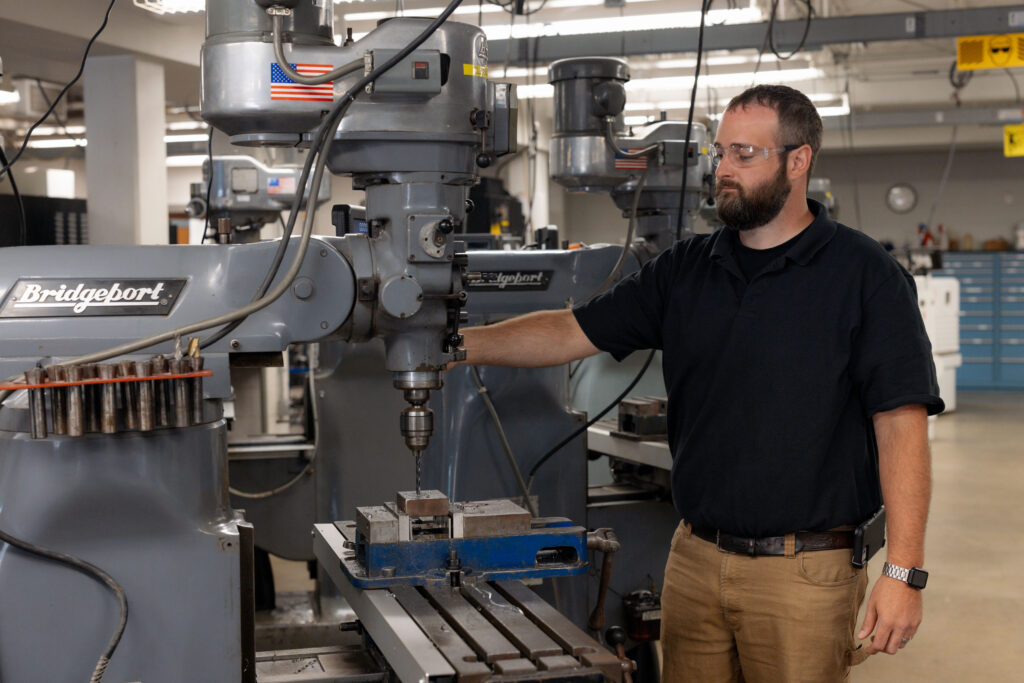Dalton Foley currently works for C4 Columbus Area Career Connection as a Precision Machining Technology Instructor. His interest in machining started in high school when he first joined the same C4 machining program as a sophomore. “Through [the C4 machining program], I had the opportunity to participate in school-to-work, which gave me on-the-job experience while I was still a student.”
Dalton reflects that this valuable experience helped him discover a career path he was passionate about and laid the foundation for his future. After over seven years in the industry as a toolmaker at a local machine shop and completing dual associates degrees at community college developing skills, Dalton was presented with the opportunity to return to the classroom as an instructor.
This unexpected career shift was life-changing for Dalton as he discovered how rewarding it could be to work with students who, like him, were looking for direction and opportunity in areas where they had aptitude.
“Stepping into the role of teacher has been one of the most rewarding decisions I’ve ever made,” Dalton says. “Now, I’m continuing that journey by working to become a better educator. Learning how to teach more effectively and support my students in new ways. Which is why I’m currently pursuing a master’s degree in Career and Technical Education.”
Choosing to Pursue a Ball State Degree
Dalton admits that until 2024, he thought he had completed his formal education. Around that time he began to realize that he wanted to expand professionally, and that meant looking into more college courses. It was during this research that he discovered the Ball State master’s degree in Career and Technical Education and his whole outlook was changed when he realized that he met the requirements for admission with his previous education and experience.
“What made this opportunity possible,” Dalton explains, “was my industry background and the experience I’ve gained through teaching under a Workplace Specialist license. I don’t hold a traditional undergraduate degree in education, and without my years of on the job training and teaching experience, I wouldn’t have been eligible for a graduate program like this.”
The Workplace Specialist II license with no earned degree provides a pathway to admission into the MA in Career and Technical Education.
“What made this opportunity possible was my industry background and the experience I’ve gained through teaching under a Workplace Specialist license. I don’t hold a traditional undergraduate degree in education, and without my years of on the job training and teaching experience, I wouldn’t have been eligible for a graduate program like this.”
How the CTE Program Influences Real-World Work
Dalton goes on to share that this unique program has opened doors and expanded his opportunities. “I’ve always been a strong supporter of non-traditional education, especially career paths like machining that are built around on-the-job training,” he says. “In many fields, real-world, hands-on experience is just as important, if not more than, a postsecondary degree. That belief is what led me to pursue this master’s degree.”
Dalton’s why is this: “I want to become a better educator for students who may be following those same non-traditional paths. This program helps me grow as a teacher, gives me better tools to support my students, network with similar professionals, and also opens up options for my own professional future.”
“This program helps me grow as a teacher, gives me better tools to support my students, network with similar professionals, and also opens up options for my own professional future.”
When asked about how the program has directly affected the work that Dalton is doing, he explains: “I’ve taken bits and pieces from each Ball State course that I have taken, and applied them almost immediately in my classroom or within my department. Whether that be educational technology, suggestions from other professionals through discussion boards, feedback from the professors, leadership and research skills, structuring better lessons, etc.”
“I’ve taken bits and pieces from each Ball State course that I’ve taken, and applied them almost immediately in my classroom or within my department.”
Dalton is proud to credit some of the past 8 years of success to his family, colleagues, local business partners, and administrators, as well as his mentor, Mr. Darin Johnson, a proud Ball State alum and professional associate of Dalton’s. He also appreciated the help of his advisor, who helped him create a plan of study that was specific to his goals and provided valuable feedback throughout the program. “[My advisor] is very knowledgeable about the program and prompt to answer any questions I have,” Dalton shares.
He is proud of his degree because it was not easy to achieve while also working and being a parent and husband. “My wife backed me every step of the way,” he says gratefully.

